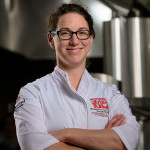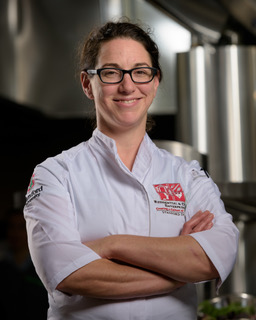- Toolkits
- Are You Ready to Talk?
- Beyond the Line
- Blocking Gender Bias
- Edgy Veggies
- First-Gen Ascend
- Fishbowl Discussions
- Measuring Mobility
- Peaceful Politics
- Plot the Me You Want to Be
- RaceWorks
- Rethinking Stress
- Space Reface
- Team Up Against Prejudice
- United States of Immigrants
- Kit Companion: Map Your Identities
- Kit Companion: LARA
- Collections
- Action Areas
- About

Science Catches Up With the Culinary Arts: Q&A With Chef Erica Holland-Toll
Stories From the Field
Science Catches Up With the Culinary Arts: Q&A With Chef Erica Holland-Toll
 In a Q&A with SPARQ, Erica Holland-Toll, executive chef of Stanford Flavor Lab at Stanford Residential & Dining Enterprises (R&DE), says that professionals in the culinary arts have always know the importance of a dish’s description, yet having the science behind Edgy Veggies to back them up has made their creative cooking choices even bolder.
In a Q&A with SPARQ, Erica Holland-Toll, executive chef of Stanford Flavor Lab at Stanford Residential & Dining Enterprises (R&DE), says that professionals in the culinary arts have always know the importance of a dish’s description, yet having the science behind Edgy Veggies to back them up has made their creative cooking choices even bolder.
SPARQ: As chef, how does this research inform the way that you plan vegetable recipes and other plant-forward dishes?
Holland-Toll: In this case, I believe it is the research catching up to the culinary world. As a chef, I was always taught that you have to sell your dish on the page first. It’s pretty rare to walk into a restaurant and see only a list of ingredients. What would you buy? Chicken with corn, peas and peppers, or herb-roasted chicken with a summery succotash of roasted peppers, fresh peas, and sweet white corn?
I think that chefs have known forever that it takes a lot of love and persuasion to make vegetables delicious and craveable. If you look at the history of food consumption, meat was hard to come by. When it was available, every last bone and scrap was utilized. Many vegetables were accented with meats. This tradition continues, especially in the South, particularly with braised greens. Not much makes collard greens taste better than a little bit of ham hock!
SPARQ: You run the Flavor Lab at Stanford. What is its mission? Does the present research play a role?
Holland-Toll: R&DE opened the Stanford Flavor Lab to provide a space and an opportunity for our chef team to explore different ways to drive deliciousness in our menus. Plant-forward cooking is very important to us. It requires a lot of testing, reworking, tasting, and research to ensure that we are developing recipes that are craveable and consistently executable. The Stanford Flavor Lab gives us an opportunity to work with faculty on research projects as well as work closely with our student body; we gather information and feedback and utilize that research to inform our decisions about the food we prepare. This partnership with Stanford Mind & Body Lab was particularly thrilling because it encouraged our chef team to really go all out and create delicious and unique vegetable dishes — we knew our nutritionist team and the labels would back us up!
SPARQ: What advice do you have for chefs and restaurant managers in terms of incorporating taste-focused approaches to healthier dishes?
Holland-Toll: Healthy doesn’t sell. People don’t want to eat dishes that are marketed as good for them. If you have a delicious roasted zucchini with mint and feta cheese, don’t talk about how good the zucchini is for you. Sell that caramelized summer squash with fresh mint and crumbled feta with pride because you know it’s delicious. The health benefits will follow.
SPARQ: What is the edgiest vegetable dish that you’ve seen on a menu?
Holland-Toll: That’s a tough one. We are blessed in California to have so many great vegetables and adventurous diners. Every year, R&DE hosts an Earth Day celebration in Arrillaga Family Dining Commons. We had some beautiful chilies from a local vendor and we had the idea of featuring them in a posole, a Mexican stew. But because it was Earth Day, we wanted it to be vegetarian, so we made a smokey morita chili posole with coriander roasted summer squash, toasted hominy, and braised greens. It was outlandishly delicious!


